Top 9 Free Saturation Plugins
PreBOX - Analog Obsession
TubeAmp - Voxengo
TUBA - Analog Obsession
IVGI - Klanghelm
TubeDriver - Nick Crow Lab
Tomato Preamp - Roxolder
Crush - Sleepycat Audio
STEQ - Analog Obsession
Tape Cassette - Caelum Audio
Saturation has become an increasingly popular form of processing - probably due to how clean digital processing sounds.
When coupled with the expense of purchasing quality hardware for saturation, it’s clear why more and more producers are turning to saturation and analog emulation to create some of the classic tones people love.
With that in mind, we sought out to find some of the best free saturation plugins for any engineer on a budget. What’s more, some free plugins are just as good if not better than their expensive counterparts, so it never hurts to try them out for yourself and see.
We’ll be listing our picks for the top 9 free saturation plugins, detailing the functionality of the plugins, talking a little bit about saturation in general, and discussing some of the technical aspects of what each plugin does.
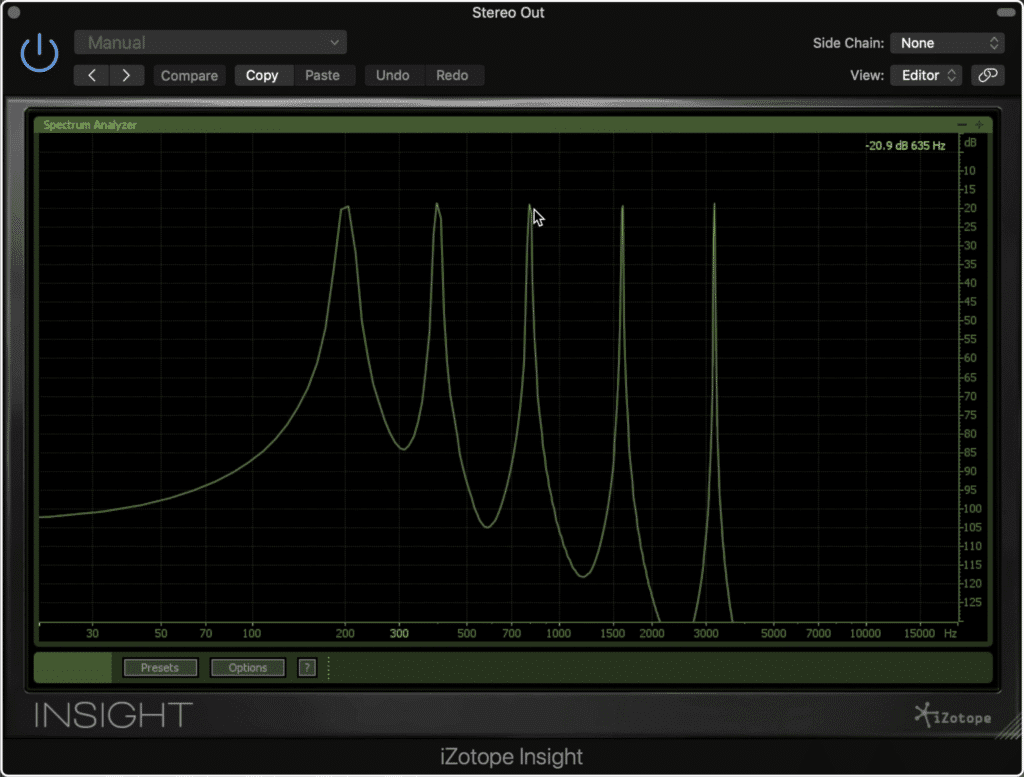
This is what the clean signal looks like. When the signal appears as these 5 test tones, no distortion is occurring.
We’ll also be observing the effect these plugins have on a signal by using 5 clean test tones at 200, 400 800, 1800, and 3200 hertz , and then using the saturation plugin on the master output.
Additionally, we’ll be checking out some real-time audio examples of the plugins in use - for these examples check out the video embedded above.

All of the plugins listed can be used on both Mac and PC operating systems.
Lastly, it helps to know that these plugins are in no particular order, as each has its merits and uses. Additionally, each plugin shown here is compatible with both Windows and Mac operating systems.
If you have a mix that you’ve been working on and you’d like to hear it mastered, send it to us here:
We’ll master it for you and send you a free sample for you to review.
9. PreBox by Analog Obsession

The PreBox has a classic analog design.
Analog Obsession is a great indie developer that we mention a lot on these free plugins lists. The reason being, they offer some great free plugins that model themselves off of famous analog equipment.
This is definitely the case with the PreBox preamp plugin. Whether you’re trying to add some character to a digitally recorded signal, or you want to crush a signal via a bus or auxiliary track, the PreBox is a straightforward yet versatile option.
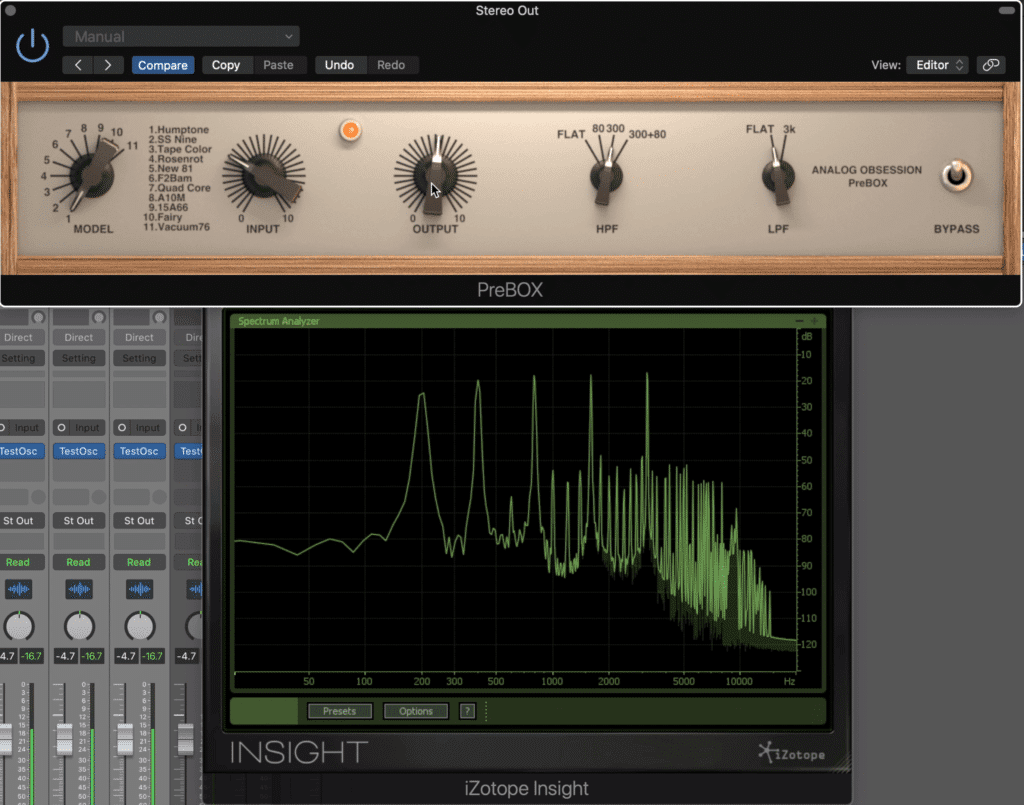
Harmonics can be altered via the rotary on the far left. 11 settings are available.
With 11 different preamp settings, you can create various forms of harmonic generation to suit the style of your music or recording.
If we look at the frequency analyzer we can see that we have our original 5 test tones, but when we turn the plugin on we create various harmonics that change in amplitude and order with each different preamp model type.
The input rotary increasing the amplitude of the input, whereas the output does the same to the output. Increasing the input gain while decreasing the output can create even more harmonics and makes this plugin a true saturation plugin.
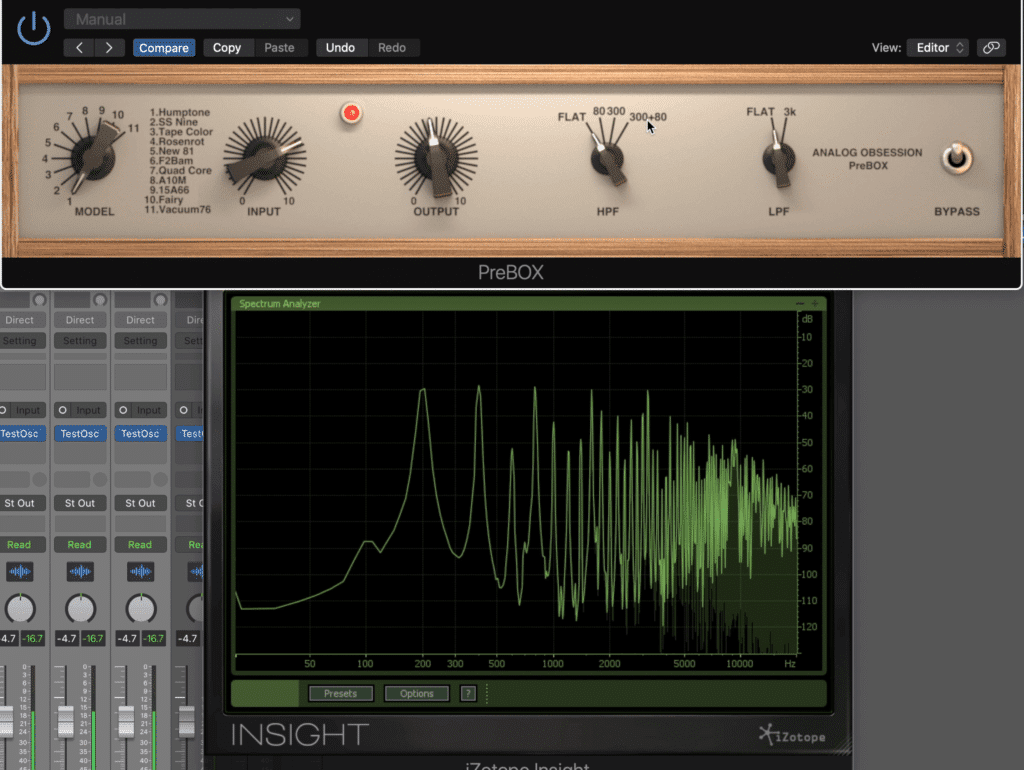
Notice how compression and distortion create saturation. The original signal is decreasing in amplitude, while the harmonics are increasing, making for a more distorted and compressed sound.
In other words, since saturation is really the combination of both harmonic distortion and soft knee compression, there needs to be an aspect of dynamic control or attenuation in order to be a real saturation plugin.
With that in mind, notice how the gain of the original signal decreases while the amplitude of the harmonics increases. This shows us that our dynamics are being controlled and that compression is occurring.
Lastly, this plugin has a high-pass filter up to 380Hz, and a low-pass filter with one setting of 3kHz.
A bypass switch allows you to quickly compare your original and your affected or processed signal.
8. Tube Amp - Voxengo
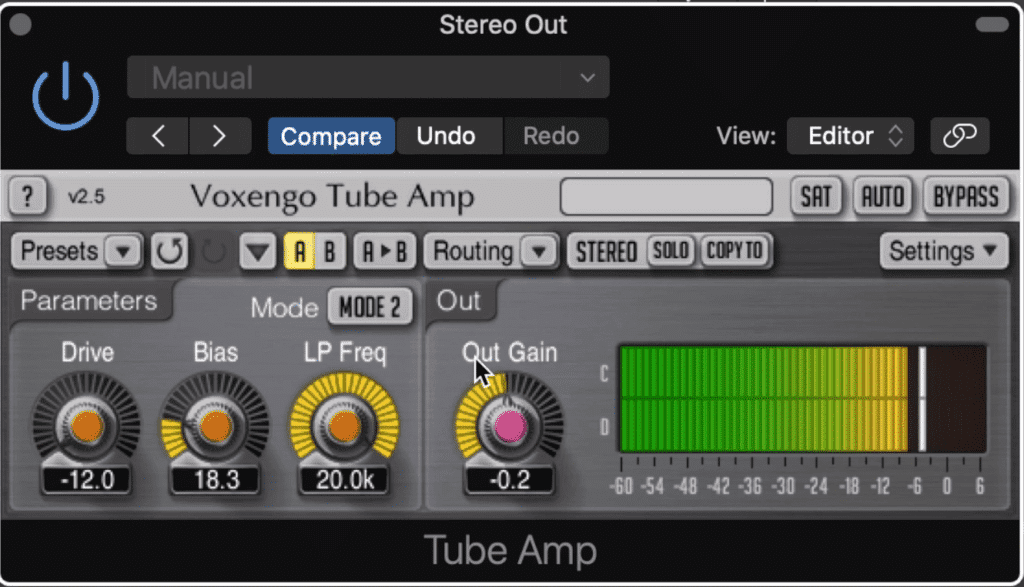
Voxengo's Tube Amp is a more modern take on saturation.
Voxengo is another developer that creates some great free plugins. Some of which are saturation plugins like the TubeAmp, while other free plugins from Voxengo range from metering, to delay and equalization.
When it comes to the Tube Amp, there’s definitely a lot to get excited about.
In the first panel to the left, there are 3 rotaries - drive, bias, and a low-pass filter. 2 modes offer different tube distortion types, with mode 1 being quieter and mode 2 being more pronounced and noticeable.
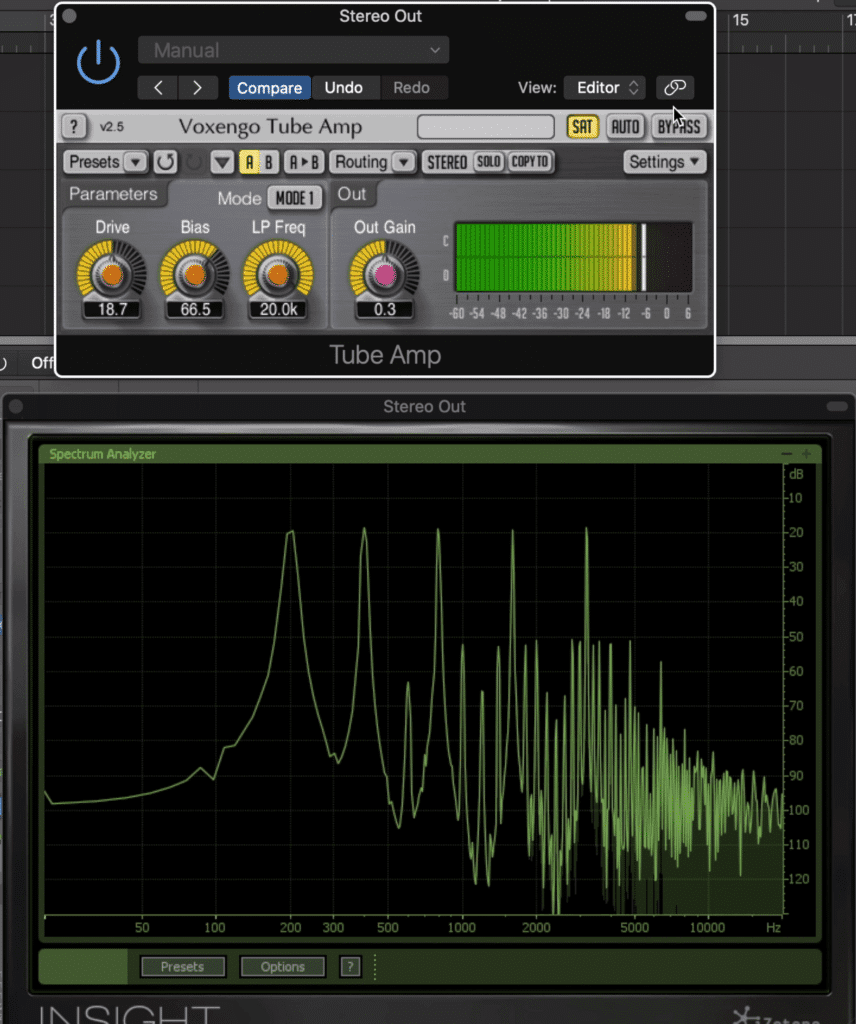
The Tube Amp generates complex harmonics and saturates the signal to create some compression.
Drive increases the amplitude of the harmonics, bias, alters the balance between the original signal and the harmonics, and the low pass filter attenuates the high-frequency range.
Additionally, we have an output gain rotary and a meter showing the current status of the amplitude in dB.
A Saturation function increases the gain of the harmonics and causes the original signal's gain to decrease when the drive rotary is increased. An oversampling function to the right of the saturation function increases the sampling rate to decrease any aliasing that might occur at lower sampling rates.
Like almost all of Voxengo’s plugins, the Tube Amp can be customized from the routing to the appearance of the interface and metering.
7. TUBA - Analog Obsession

The TUBA is also by Analog Obsession and emulates the sound of tube-based channel strips.
The 2nd of 3 Analog Obsession plugins on this list, the TUBA is a channel strip plugin designed to evoke classic tube saturation.
Simply placing the plugin on the signal creates complex harmonic generation. The high and low gain setting increases the number of harmonics while decreasing the original signal.
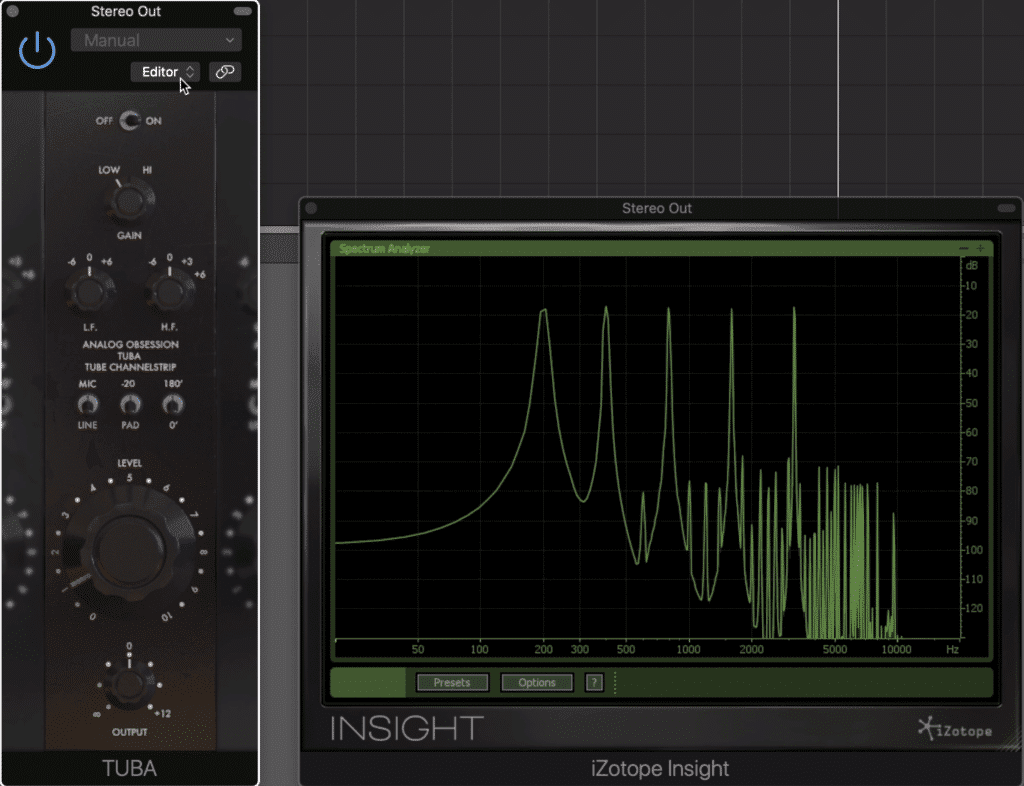
Notice the complex harmonic generation to the right. All of the harmonics are roughly equal in amplitude.
Low and high-frequency shelves can be introduced from -6dB to 6dB. A mic and line switch is available as is a 20dB pad. This pad doesn’t decrease the amplitude of the original signal, just the added harmonics.
The phase inverter is also unique, as it doesn’t process the entirety of the signal, but instead inverts the phase of the processed will still allowing the incoming signal to be processed by the plugin, resulting is complete phase cancellation between the two separate signals - this might be changed in a later version of the plugin.
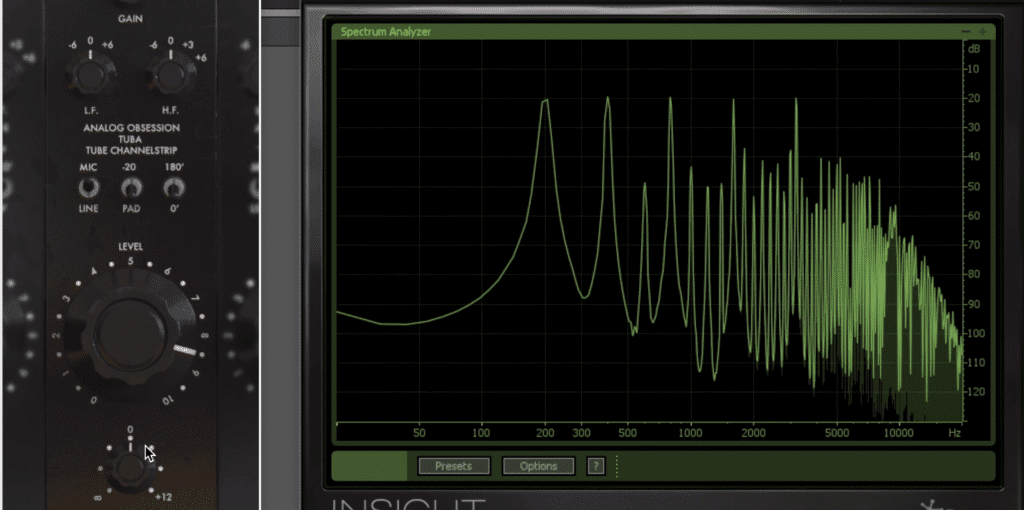
Increasing the level increases the amount of saturation.
What’s great about this level rotary is that its gain compensated, meaning the decreases the gain of the output to account for the added amplitude of the harmonics , in turn maintaining an almost constant gain.
Lastly, there’s an output rotary to increase the level of your output.
6. IVGI - Klanghelm
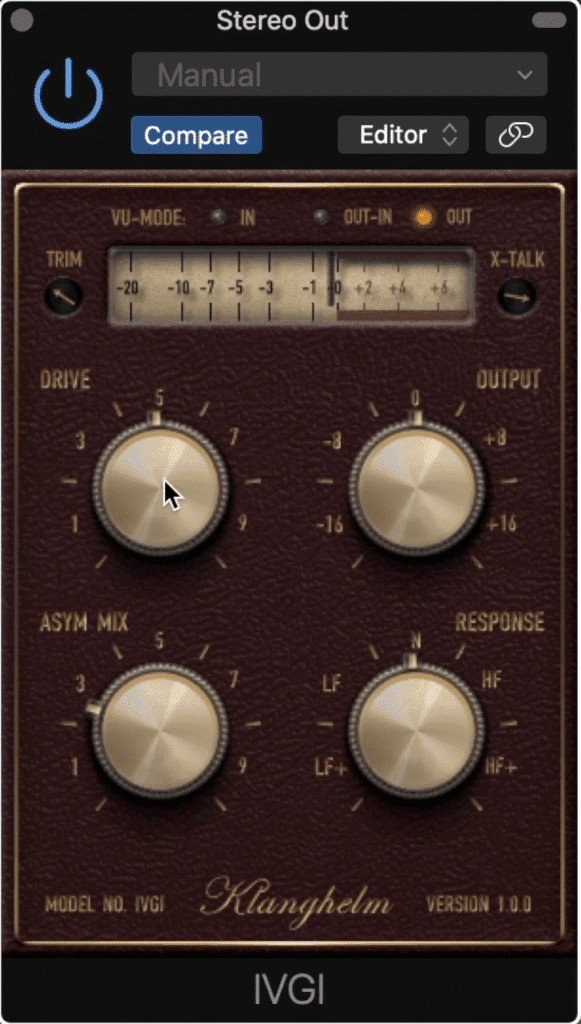
The IVGI is a classic free saturation plugin.
IVGI by Klanghelm is a classic free saturation plugin that easily creates a lot of character on an individual instrument or mix.
If you’re looking for a quick way to alter the sound of your recording, and to add some fullness via saturation, the IVGI is a great option.
The Drive rotary introduces complex harmonics, and the output serves as a regular output.
The Asym Mix alters the amount of compression with 0 being the most and 10 being the least , and Response rotary introduces a shelf filter to the harmonics based on the setting chosen.
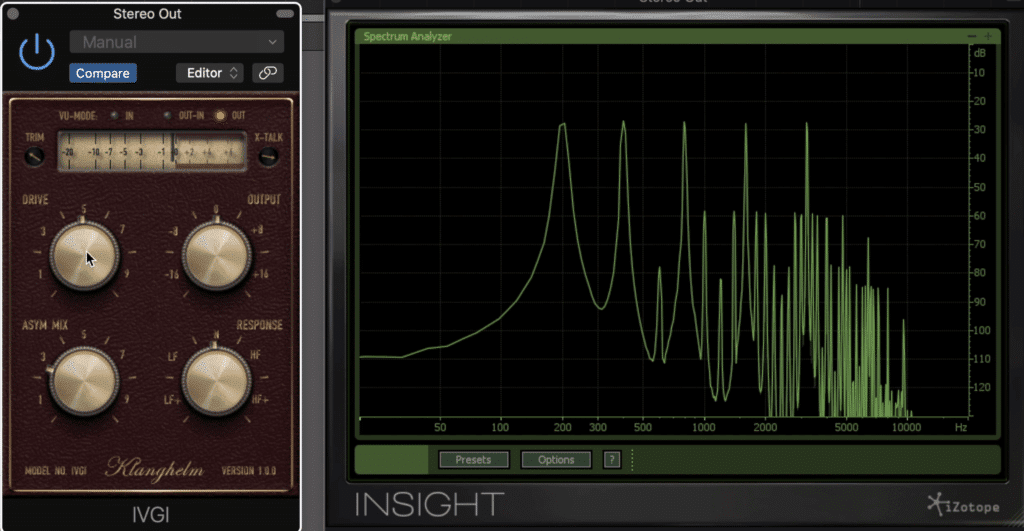
The drive and Asym functions allow for more harmonics and greater compression.
The trim dial at the top allows you to increase the input, with 0VU being the optimum level, whereas the X-talk is your crosstalk between the left and right channels.
The VU meter can be set to input, RMS or the average loudness of the signal, and the output. Additionally, you can click on the VU panel to bypass the plugin.
5. TubeDriver - Nick Crow Lab
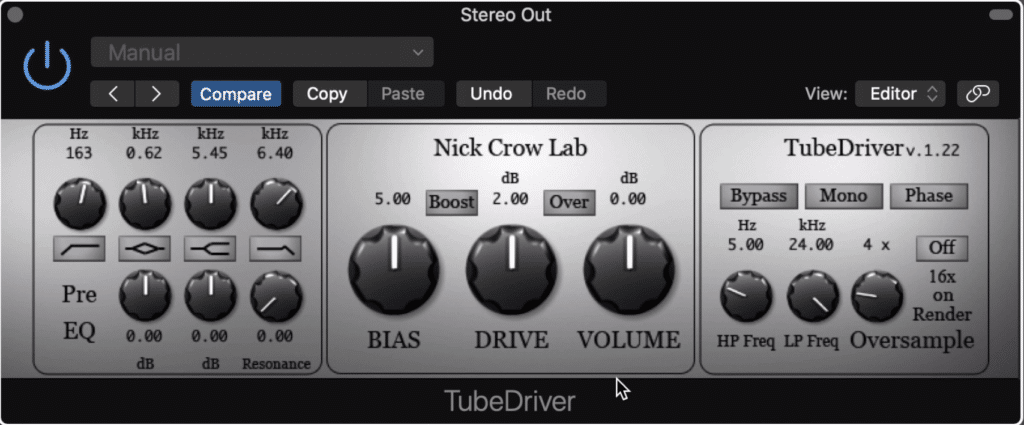
The TubeDriver utilizes both harmonic generation and equalization.
The TubeDriver does as the name suggests, which is introduce harmonics and saturation that closely emulate the sonic characteristics of tube amplification.
The harmonics generated are complex and are pretty noticeable right when you insert the plugin on your track.

The plugin generates some loud and complex harmonics.
In the middle drive section,you have your bias which alters the amplitude between the original signal and the added harmonics , the drive function which increases the harmonics, and the volume section which increases the amplitude of the overall signal.
The boost button increases the overall gain by 10dB. Additionally and over indicator shows when clipping distortion is occurring.
On the right side of the plugin is a high-pass and low-pass filter with what seems to be a pretty relaxed slope.
An oversampling rotary decreases aliasing, with the option to use 16 times the sampling rate when rendering - which is probably unnecessary, but an option nonetheless. Bypass, mono monitoring, and phase inversion buttons are also available.
On the left side of the plugin is a pre-eq which equalizes the frequency spectrum prior to the saturation-based processing.
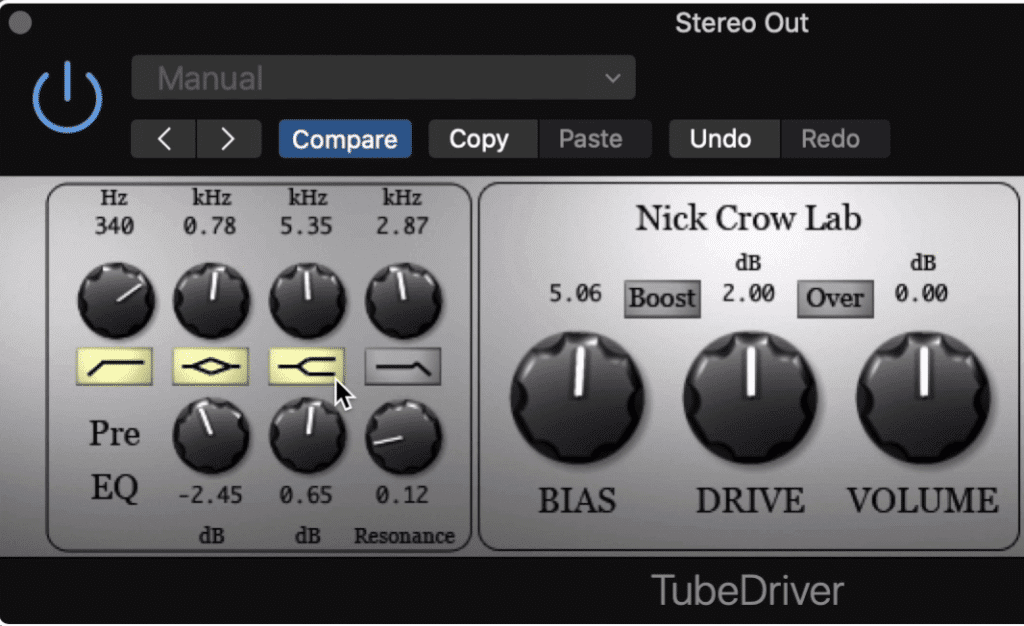
The EQ filter needs to be enabled prior to using it. This EQ is Pre-Saturation and can be used to drive certain frequencies into the distortion.
If you’re like me and you just dive into a plugin without reading the manual, you may be confused why nothing is happening when you’re altering the eq’s rotaries; however, each band needs to be enabled by clicking on the filter’s icon.
If you’re working on a mix that you’d like to hear mastered, send it to us here:
We’ll master it for you and send you a sample for you to review.
4. Tomato Preamp - Roxolder
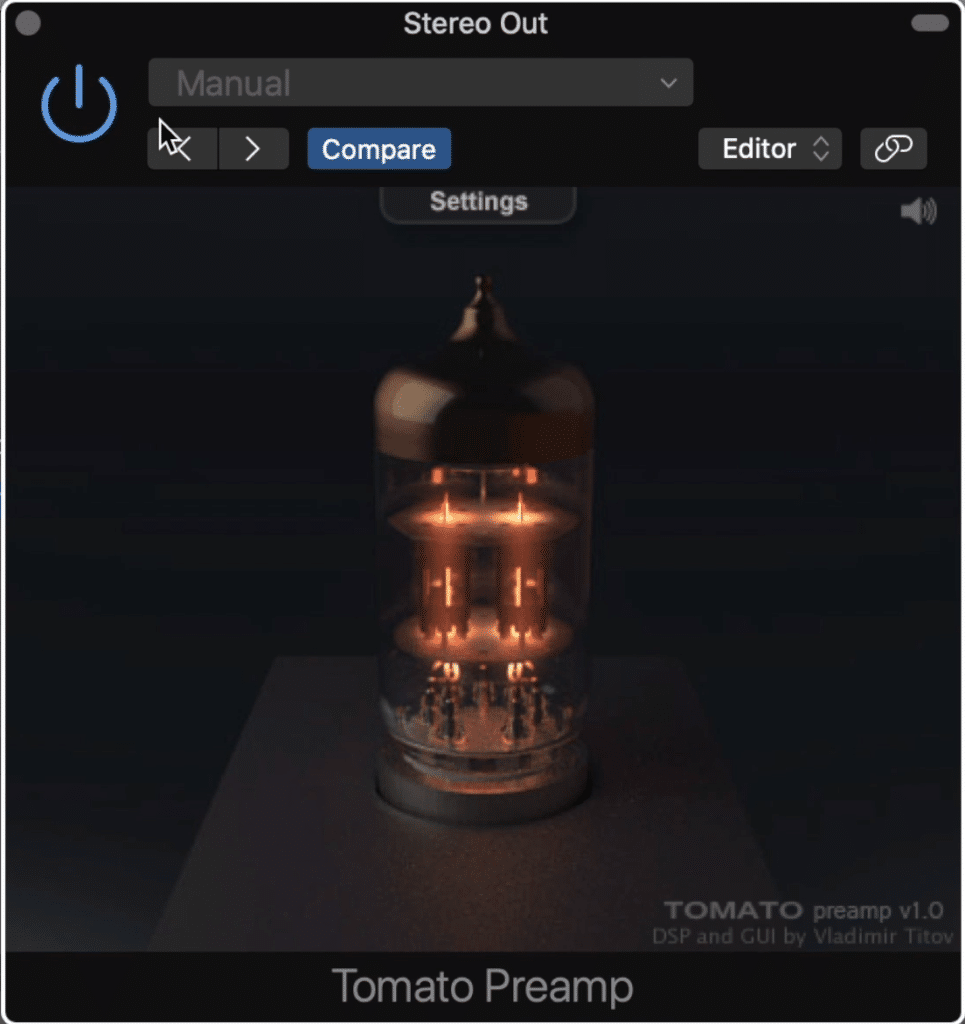
Although the Tomato preamp looks like it would evoke a warm tone, it makes more of a lo-fi sound.
Although the look of this plugin may make it seem like it would generate pleasant-sounding harmonics that add some warmth to the signal, the Tomato preamp creates a harsh and lo-fi sound.
This makes it great for adding some unexpected character to a signal and evoking a sense of classic lo-fidelity recordings.
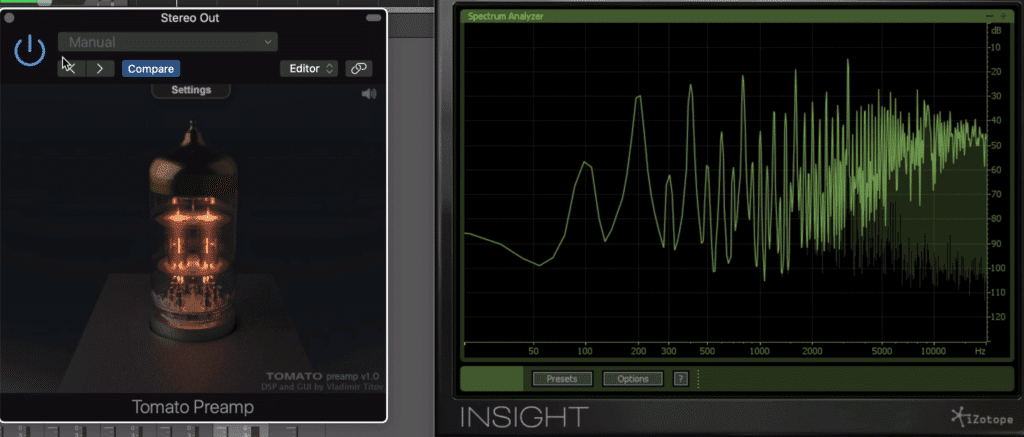
Notice how significant the distortion is.
By looking at the frequency analyzer, you can already tell that this plugin does a lot to the signal, but let’s take a closer look to see what’s happening.
3 distinct tube models offer different lo-fi sounds. The aged being the harshest and most distorted, with the newest being slightly, but still maintaining a good deal of distortion.
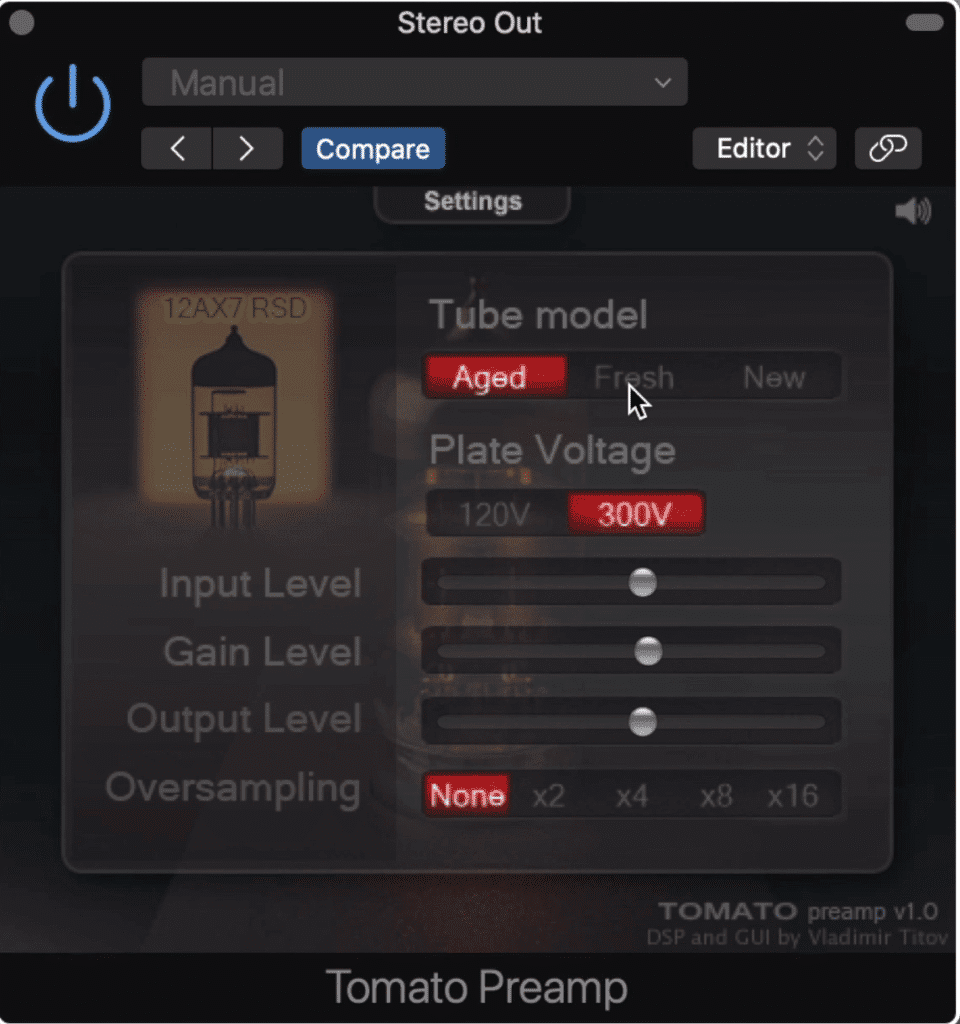
Various settings between old and new tubes later the tonality of the distortion, but the sound is always heavily distorted with this plugin.
It also sounds like each setting creates a high-pass filter that attenuates the lower frequencies to create a thinner sound.
Although seemingly equally chaotic in nature, the 3 tube types and 2 plate voltage options offer a great deal of difference in tonality.
The input, gain level, and output level does little to nothing to decrease the amount of distortion present, making this plugin pretty limited.
With that said, it still does offer something unique and deserves some attention.
Lastly, an oversampling function reduces the amount of aliasing.
Want to know more about analog distortion and emulation? Check out our blog post on the topic:
3. Crush - Sleepycat Audio
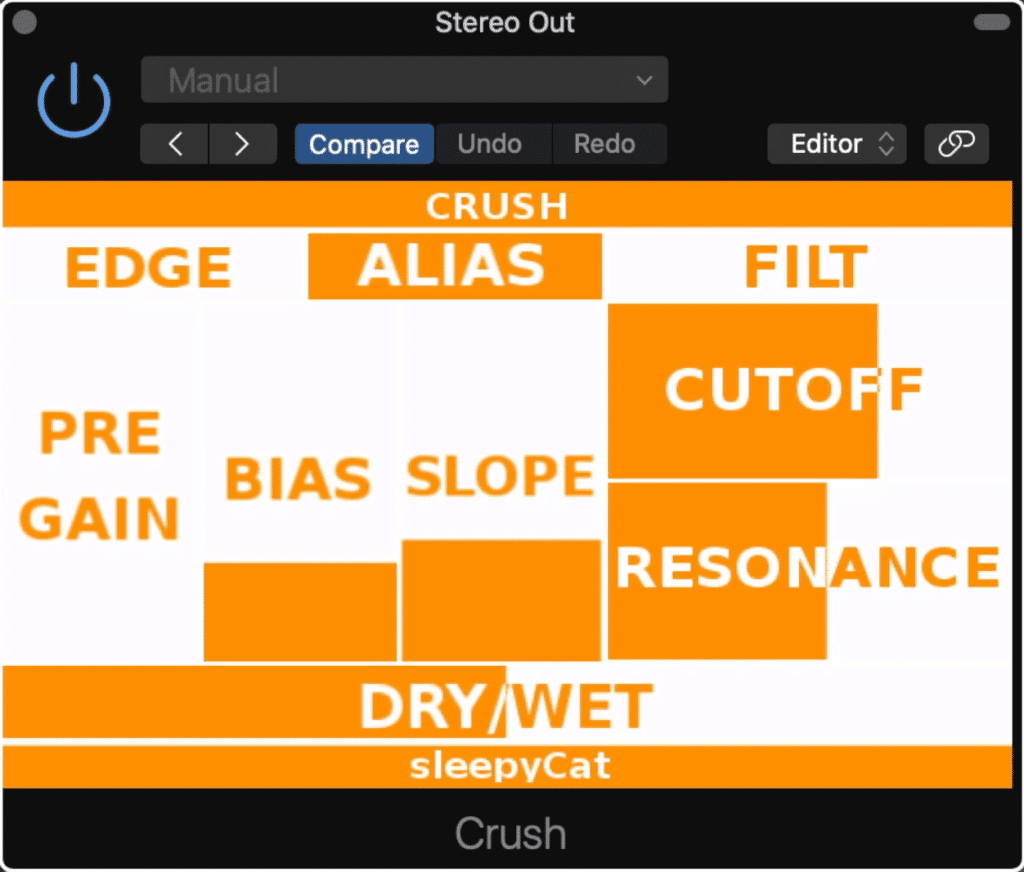
Crush emulates cross over distortion on class-b amplifiers.
The Crush plugin by Sleepycat can be a little difficult to understand. Maybe its the lack of any values, or the functions that don’t correspond to common audio terms.
Despite the reason for ambiguity, Crush can still create some unique distortions.
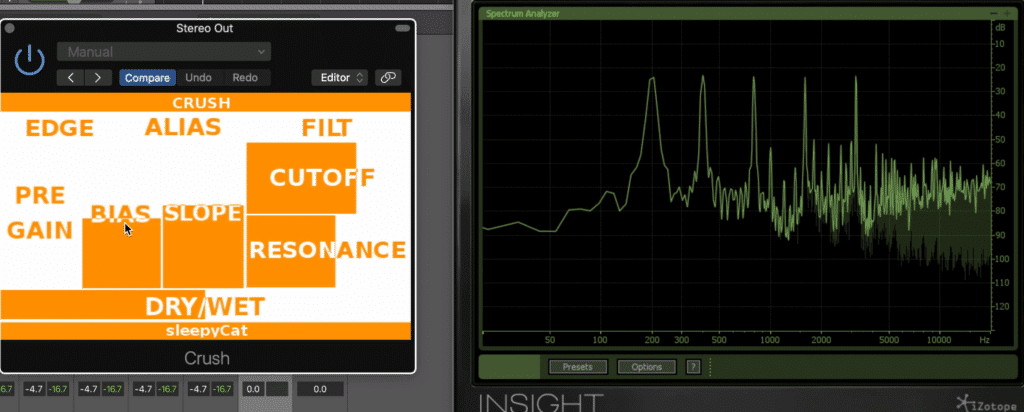
Distortion occurs when lowering the bias function.
Designed to emulate cross over distortion that resulted from slight input to output latencies in class-b amplifiers, the Crush plugin starts off with a unique premise.
The Pre Gain function allows for amplification prior to any distortion. Lowering the bias function can trigger distortion, whereas decreasing the slope function seems to decrease the amplitude of the original signal.
The Alias function turns off oversampling, resulting in some intermodulation distortion, and the phase cancellation of some high frequencies.
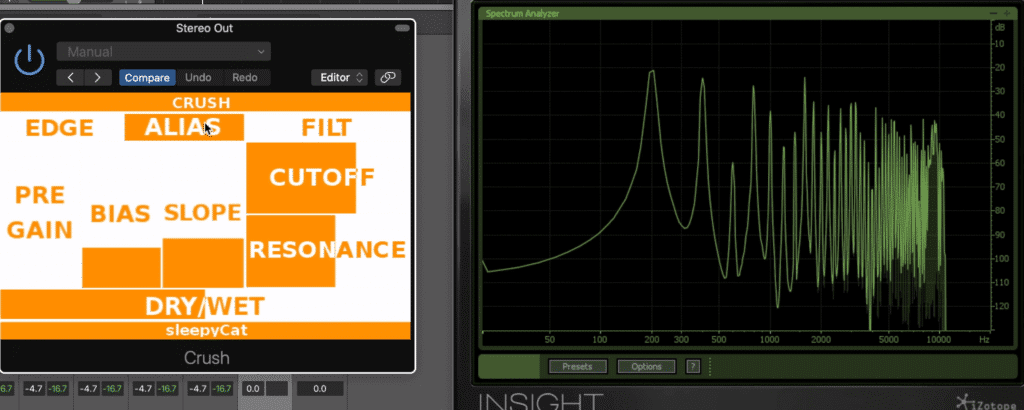
Notice that when the alias function is enabled, the high-frequency range is truncated.
As for the Edge function , I still don’t completely understand what this does exactly. Even after reading the manual and testing the plugin, the only noticeable thing this function does is turn off distortion created from lowering the bias slider.
The filter section creates a low-pass filter and a resonance filter at the edge of that cutoff.
At the bottom of the plugin is a wet/dry slider.
2. STEQ - Analog Obsession

The STEQ combines equalization, compression, and distortion.
The final plugin on this list designed by Analog Obsession, the STEQ is a combination of a few different forms of processing.
First and foremost, it is an analog emulation plugin that introduces harmonics - but whereas other saturation plugins may hide the compression behind the scenes, the STEQ allows you to introduce smooth optical compression separate of the harmonics.
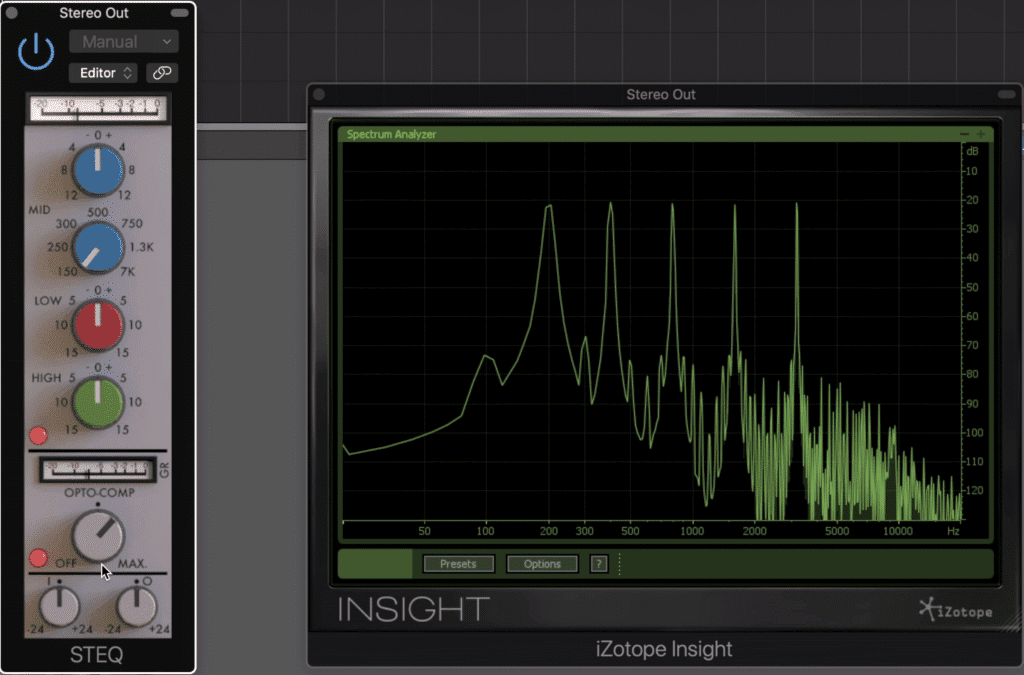
The plugin instantly causes harmonic generation. These can be made more complex by driving the input and decreasing the output.
Additionally, an equalizer up top allows for some quick altering of your signals frequency response. The bands have been separated into a mid, low, and high, with a range of24dB for the mid-band, and 30dB of range for the low and high bands respectively.
An input meter at the top shows the amplitude changes caused by the plugin, whereas a gain reduction meter above the compressor shows how much attenuation is occurring.
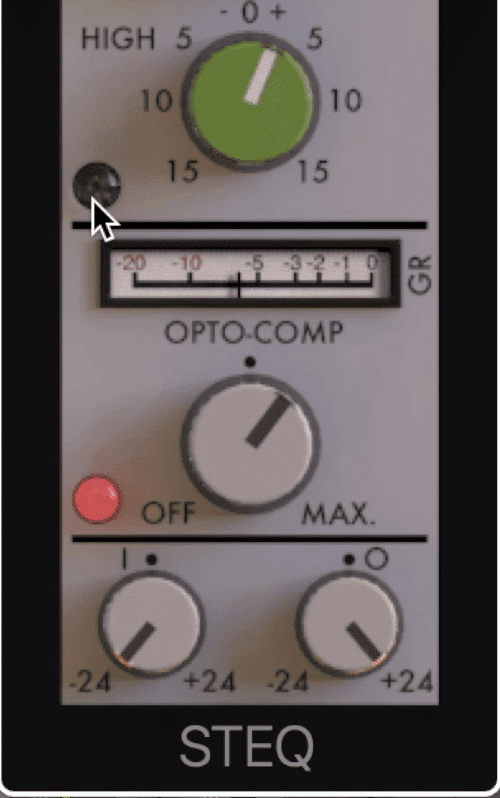
The red light is a bypass function. When red, the function it's associated with is on.
An input and output rotary at the bottom allows for even more saturation, and the ability to increase the tonality of the plugin by lowering the input while increasing the output.
One more thing to note is this red button next to both the EQ and the compressor, which I initially mistook for a clipping indicator. Instead, this button is a bypass switch for the EQ and the Compressor. When the indicator is red the processing is on, and when it’s off the function is bypassed.
Interested in learning more about saturation? Check out our blog post and video on the topic:
1.Tape Cassette - Caelum Audio
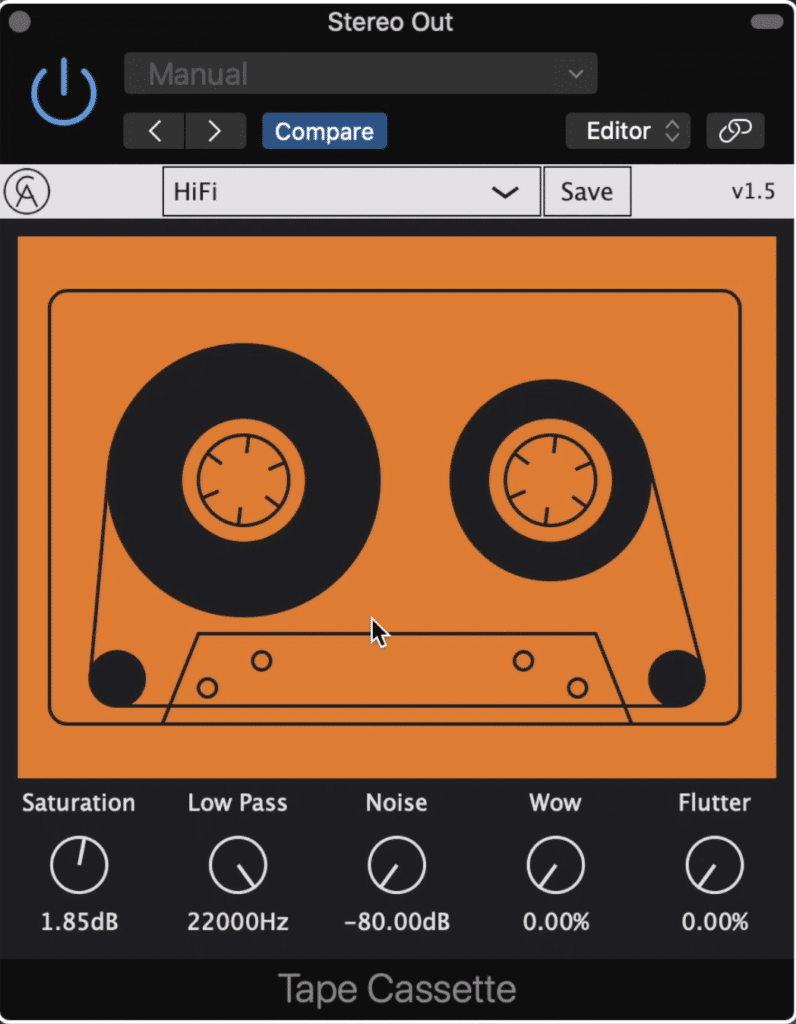
The Tape Cassette plugin is great for anyone looking for some unique saturation.
Although I said this list was in no particular order, I have to admit that this is my favorite free saturation plugin that I came across.
Whereas tape machine emulation is pretty common, tape cassette emulation isn’t, making this plugin useful for anyone looking to create a distinctive lo-fi sound indicative of old cassette tape recorders like the Tascam Portastudios of the 1980s and 90s.
The interface of the plugin is pretty simple, with just five functions to consider.
The first, saturation, introduces harmonic distortion and alters the amplitude of the signal as a whole. These harmonics sound really similar to that of a tape cassette, making for an instantly impressive sound.
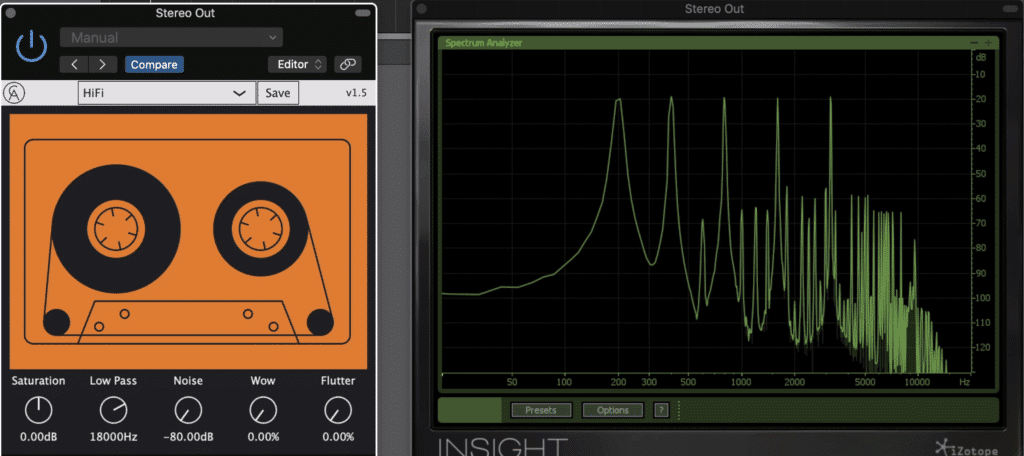
The Tape Cassette can saturate your signal, as well as add wow and flutter.
A low-pass filter attenuates the high-frequency range, making the tape sound more indicative or Tape Type 1 cassettes , which are known for their truncated high-frequency range.
A noise function emulates the self-noise of a cassette recorder and the tape itself. This can be turned down though to nearly imperceivable levels.
Lastly, wow quickly alters the pitch of the signal, whereas flutter does the same to the higher frequencies, in turn causing phase cancellation and distortion.
Some presets are available to get you started.
If you want to learn more about cassettes and mastering for cassette check out our blog post and video on that very topic:
Conclusion
Audio engineering can be an expensive hobby and profession.
Fortunately, free plugins like the ones mentioned here give engineers the opportunity to create and explore audio engineering without needing to spend an absurd amount of money.
As digital processing becomes more available, and the tools for creating plugins are simplified and become more user friendly, new and great free plugins will become available.
Keep an eye out for these free plugins, as they may soon outperform some of the ones you have been paying for.
If you’re looking to download these plugins for yourself, a website known as VST4Free is a great source. Additionally, some of these plugins can be found on the developer’s websites.
Lastly, all of these plugins are compatible with both PC and Mac, so be sure to check them out - you won’t be disappointed by a missing AU component or Windows VST.
If you found this blog post helpful, and want some more help with your productions, send us a sample of one of your mixes:
We’ll master it for you and send you a free sample of your master.
Have you tried one of these plugins before?




